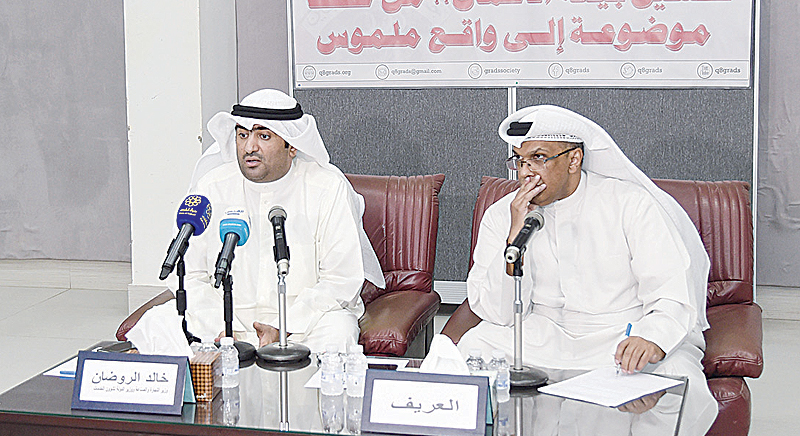Amir wishes to have free markets with the Iraqis: Minister Roudhan

KUWAIT: Kuwait plans to issue multiple entry visas to nearly 400 Iraqi businessmen as per an agreement reached recently between the two countries, a senior government official said yesterday. Minister of Commerce and Industry and State Minister of Services Affairs Khalid Al-Roudhan explained that a special committee was formed with the Iraqi side under the name "white list", which includes issuing multiple entry visas to nearly 400 Iraqi businessmen. "We have an ambitious plan to open different markets," said Roudhan, who was speaking during an open meeting at the Kuwait Graduates Society yesterday. "His Highness the Amir Sheikh Sabah Al-Ahmad Al-Jaber Al-Sabah wishes to have free markets with the Iraqis and we have reached an advanced stage."
About food reserves, Roudhan said since the last Gulf crisis, "we upgrade the emergency plan every six months - Kuwait's structure is very strong and we have developed it." He said many co-op branches supplying rations have been closed, and food reserves are very good. He said the introduction of the technological aspect to the commerce ministry was a decisive element in the development of the ministry, as electronically linking ration services reduced costs to KD 34 million annually, although the system itself did not cost more than KD 10,000.
Bedoons in military
A batch of bedoons who were supposed to be accepted in the military this month have to wait for the law to resolve the issue of stateless residents, which is expected by yearend according to an announcement National Assembly Speaker Marzouq Al-Ghanem made on Sunday, informed sources said. More than 1,500 bedoons were accepted to enroll in the military, including Kuwaiti women's children, those included in the 1965 census and children of military men, the sources added.
Expats in public schools
A specialized committee at the education ministry prepared a technical memo on the increasing student density in public schools, which will be submitted to Education Minister Hamid Al-Azmi. The memo criticizes the increase in expat categories which allows their children to be admitted in government schools where enrollment is exclusive for Kuwaiti students. These groups are considered 'large' according to the memo, which questions the 'justifications' based on which expats in certain exempted categories are allowed to enroll their children in government schools. Some schools have a large number of expat students, like in Farwnaiya, which puts pressure on school capabilities, said sources familiar with the memo, adding that the number of expats in schools can be reduced by half if some exempted categories are cancelled. The exempt categories currently include children of expat teachers, workers at the education ministry, workers at the Arab Open University, funeral workers, lawyers and diplomats as well as workers at some educational centers.
.jpg)
